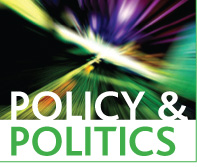Anne Grødem and Jon M. Hippe
 This section of Discover Society is provided in collaboration with the journal, Policy and Politics. It is curated by Sarah Brown.
This section of Discover Society is provided in collaboration with the journal, Policy and Politics. It is curated by Sarah Brown.
In the current political climate, academic knowledge and topical expertise do not appear to be the most sought-after qualities in political leaders. Increasingly, life in the world’s capitals is portrayed as a battle for power between politicians and civil servants. Incoming politicians are often charismatic, prone to sweeping statements on complex issues, and portray themselves as representatives of the people who will “drain the swamp” and “get things done”. Among the swamp creatures, more often than not, they place civil servants: the dull nerds, obsessed with their rules and budgets, far removed from the people they are supposed to be serving. In this picture, there is a clear rift between the dynamic, if ignorant, politician and the change-averse, but smart, civil servant. Against this background, it seems more important than ever to discuss; what is the relationship between knowledge and action in politics? Or, to put it differently, is expertise important to politicians who want to get things done?
In our article, ‘The expertise of politicians and their role in epistemic communities’, we present a case that suggests that the politicians who actually get things done are those who are capable of working with civil servants, developing policies collaboratively together with them, and learning. Even better are politicians who come in with solid knowledge, who not only know what they want to do, but also how to do it and how they can convince potential opponents. The case that substantiates our argument is the reform of Norwegian pensions: a reform that requires people to work for longer in order to obtain the same retirement income. Recently in France, a proposed similar reform led to large-scale strikes, but in Norway, it passed quietly with little resistance. This suggests some skill on the reform architects’ side. How did they do it?
In our discussion, we draw on insights from the literature on epistemic communities. Epistemic communities are made up of experts who share values and causal beliefs, and who acknowledge the same set of tools to establish insight and prescribe policy solutions. It is not enough that they belong to the same profession – that is, know the same things – they must also share core values and beliefs about political action. Economists are not an epistemic community, but economists leaning towards similar understandings, such as Keynesianism or neoliberalism, for example.
Around the turn of the millennium, there was arguably an international epistemic community of economists pushing for a certain type of pension reform. This community was influential in the OECD, EU and the World Bank – and in the Norwegian Ministry of Finance. By 2001, the Norwegian node of this epistemic community was frustrated: changes were being made to the pension system, but they were going in the wrong direction. The contractual early retirement scheme had been expanded successively in the 1990s, so that workers in companies covered could retire as early as age 62. Repeated attempts had been made to halt this expansion through the 1990s, but the trade unions kept pushing it forward. Leading politicians in most of the larger parties, including the Labour party, were concerned about this development as they saw a general need to increase employment rates. Since the scheme was negotiated by trade unions and employers’ organisations, however, they were powerless.
Jens Stoltenberg became Prime Minister, as head of a Labour government, in 2001. Stoltenberg had been Minister of Finance in a previous government, had a master’s degree in economics, and he made one of his closest aides Minister of Finance in the new government. This was a set-up for very close collaboration between the Ministry of Finance and the PM’s office. One of the informants in our study, who worked in the Ministry of Finance at the time, described it as “seamless… there were no doors”. Somewhere along this axis between the Ministry of Finance and the PM’s office, the idea of a new pension commission was hatched. The Commission was appointed in 2001.
The 2001 pension Commission was unusual in a Norwegian context in that it was made up mainly of politicians. All the major parties in Parliament were represented, while trade unions and employers were excluded. Equally importantly, the Commission was entirely dominated by economists. Most of the party representatives came from the Parliament’s Standing Committee on Financial and Economic Affairs – not from committees working on social issues – and many had at some point worked in the Ministry of Finance. Of the four independent experts in the Commission, three were economists. The epistemic community in the governmental offices could thus trust that the Commission members spoke their language.
The academic literature on epistemic communities, as well as the literature on the power of economists, both highlight that politicians are more likely to turn to experts when the issue at hand is seen as complicated and technical. This is clearly the case with old age pensions. The members of the Commission may have wanted to improve work incentives and contain costs in the pension system, but they did not start with clear ideas on how to achieve these goals. They were guided through the technicalities by the secretariat, which was run from the Ministry of Finance’s offices.
With the help of the secretariat, and much to everybody’s surprise, the Pension Commission agreed on a joint proposal for a radical pension reform. We argue that in this process, the Commission members were in effect recruited to the epistemic community of economists pushing for pension reform. At the outset, most of them shared the professional background with the civil servants in the Ministry of Finance. After almost four years of intense discussion, they also shared core values and belief about the proper political action.
With the Commission’s report, the epistemic community showed its hand. Previous research indicates two stylised processes that may ensue from this point. One is the possibility that the new ideas become institutionalised, that is, become part of the dominant cognitive infrastructure. If so, the epistemic community has won. The second is that the epistemic community’s analyses become the new battleground. The expertise and guidance provided may serve to increase the ability and confidence of other actors to create alternative and rival knowledge. This is what scholar Claire Dunlop, in an article from 2017, has called “the irony of epistemic learning”.
By 2004, there was no shortage of rival expert communities eager to shred the Commission’s proposal. The trade unions in particular were infuriated, and they had their own secretariats, including highly skilled economists, who were ready to promote alternative ideas about the future pension system. At this vulnerable stage, a different type of leadership was necessary in order to bring the proposed pension reform forward.
We suggest that this leadership found two forms. The members of the Pensions Commission were crucial: they had spent almost four years poring over pension issues, now they went back to their colleagues in parliament and defended the proposal. Being both trusted members of their parties and experts on the issue, they strongly influenced decisionmakers.
The other form of leadership was personalised by Jens Stoltenberg, who by 2004 was leader of the Parliamentary opposition. The government was committed to maintaining broad consensus on the pension issue and recognised that Stoltenberg – as an economist and opposition leader – was crucial in order to make this happen. The doors to the Ministries were therefore opened, and Stoltenberg had several meetings with a civil servant to fully understand the proposal. He then went on to apply this knowledge in debates with other experts, as well as in addresses to the general public – and he had intense discussions with the trade unions. As a politician, he understood how important pensions were to the trade unions and was able to win support from influential unionists; as an economist, he could counter any argument rival experts brought up. This is a key point: a professor in economics could draft a new pension system, but he would not understand the political games well enough to gather the support a reform would need. A career politician could work via his network and charm people to support him, but he would need a lot of help when challenged by issue experts.
The new pension system in Norway has been effective since 2011. It is important to note that nobody had a blueprint for how this system would look at the beginning of this process. The pension reform process was a process of mutual learning, where the civil servants had expert knowledge while politicians understood the rules of the game – and where key politicians could draw on their background as economists. In the intense processes, several politicians acquired expert knowledge of their own, and academic politicians could use their knowledge to convince economists in the trade unions. Our main point is that a politician who has genuine expertise, either because he/she has worked consistently on an issue over time, or because he/she is herself an expert by education, can act both as “an expert” and as “a politician”. For this reason, we suggest that politicians who understand complex issues and work with them systematically are the most likely to get things done.
Anne Grødem is Research Professor at the Institute for Social Research in Oslo, Norway. Jon M. Hippe is General Manager of the General Manager of the Fafo foundation and leader of A-pressen.
Image: William Gladstone as a jockey, falling from his horse
